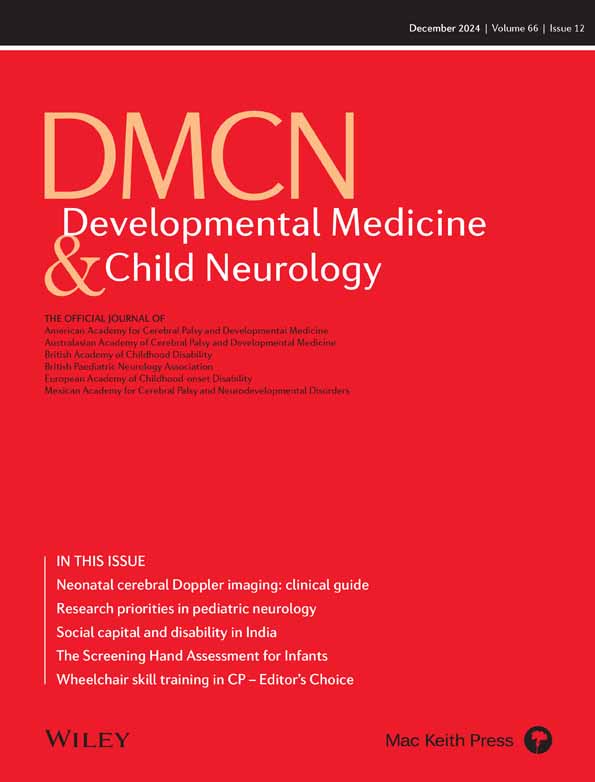DMCN 2024 highlights: Quality research, epidemiology, and parental perspective
This past year has seen important developments in our field of developmental disability, from better knowledge about neonatal development to health issues and lived experience of adults with childhood-onset disability. There has also been increasing awareness of cultural and global perspectives, and transformative technological advances. All these and more are reflected in this year's volume of the journal.
We have continued to pursue our mission with appropriate methodologies and useful reporting. We have expanded our series of invited reviews on this topic, for example addressing design and statistical methods for observational studies with a focus on causal inference. Our collaboration with Cochrane Rehabilitation has been strengthened, both through publication of Cochrane Corners and proactive participation in the group's work, which has broadened its focus to functioning and disability. Artificial intelligence is transforming research practices, for the better but occasionally threatening scientific processes; however, the norms of integrity remain unchanged. We are now striving to enhance the transparency and reproducibility of studies based on machine learning by requesting that authors provide a model card. We are continuing our series on state-of-the-art therapies, for example a review on fragile X syndrome highlighted several targeted treatments, such as metformin, sertraline, and cannabidiol, as well as emerging gene therapy. We have also started an educational series of narrative reviews on neonatal ultrasonography.
The collection of epidemiological data has been enhanced through impressive development of cerebral palsy (CP) registers in many settings, including low- and middle-income countries, stressing the importance of accounting for contextually relevant factors,1 as in Africa or the Caribbean. Treatment has also been an important focus. Early interventions to improve functional and developmental outcomes in infants with early brain injury was identified this year as the first research priority for children with neurological conditions. However, stronger research is needed in many areas, as exemplified by an updated clinical practice guideline on pharmacological and neurosurgical management of dystonia in CP that must still rest on limited evidence. Specific areas of management, such as sialorrhoea, have been the focus of a number of useful studies. Tools to assess other specific clinical features, such as pain, and their impact on functioning in clinical practice or research have also been developed.
Several important contributions have emerged which can improve earlier detection of CP to facilitate earlier intervention. Among these, Romeo et al. developed and validated the Brief-HINE, a short screening version of the Hammersmith Infant Neurological Examination (HINE) to identify which infants require a full HINE.2 Additionally, Fehlings et al. have developed a HINE scoring aid to assist efficient interpretation in clinical practice.3
The journal has also offered a forum for debate on diagnostic and pathophysiological concepts, such as abusive head trauma, neurological criteria to declare death in children, or therapy approaches, such as the Bobath Clinical Reasoning Framework. All have elicited multiple argumented responses, including by parents, who request better quality evidence. One crucial step to provide this is to engage in soundly identifying active ingredients of the interventions we propose and link those with clear hypotheses about mechanisms of action so that we can reliably evaluate ingredients' efficacy.4 Additionally, evidence should be obtained through closer collaboration with individuals with lived experience, as co-creation of research and practice guidelines, open critical co-construction of relevant projects, and co-design of strategies to improve effective health care. This is necessary to counter currently prevailing ableism and other types of discrimination that have been shown to increase the burden of caregiving and impact parental well-being.5
 We must continue to take up this task as professionals, advocates, and members of society.
We must continue to take up this task as professionals, advocates, and members of society.
CONFLICT OF INTEREST STATEMENT
The author declares no conflicts of interest.
In this issue
• A systematic review of the efficacy of intensive mobility training in children with cerebral palsy (CP) finds improvements in walking balance, speed, and endurance.• A scoping review of child-led tools for setting and evaluating goals in the context of disability suggested the DECIDE framework (Direct Elicit Construct Indicate Develop Evaluate).• A state-of-the-art narrative review presents how cranial ultrasound can contribute to decision making in newborn infants with neurological presentations.• Surveys of patients, caregivers, and clinicians identify intervention priorities for childhood neurological conditions.• A Delphi study involving adolescents with a physical disability identifies their priorities for improving their participation in physical activity.• A validation study of the caregiver-administered ESSENCE-Q suggests its utility for screening for neurodevelopmental problems in 2½ year-old children.• A qualitative descriptive study of the experience of clinicians involved in the care of children with severe neurological impairment documents physical and psychological impacts, and suggests strategies to mitigate them.• A cross-sectional study of social capital of families with a disabled child in India highlights diagnosis and mother’s education as key factors.• A study documents the development of a screening tool for the risk of unilateral CP in infants based on Hand Assessment for Infants items.• My Editor's Choice is a quasi-experimental study showing improvement in power mobility skills and participation in children and young adults with CP following a 4-week intervention.
Open Research
DATA AVAILABILITY STATEMENT
Not required.




